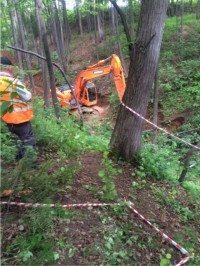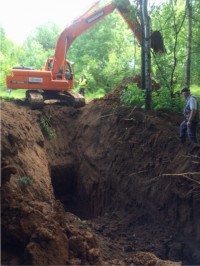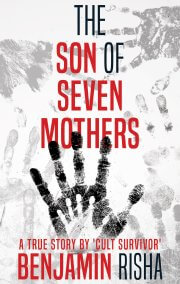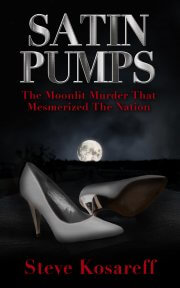
The excavator at work at the first “deadend” site
I apologize for the delay between posts for those of you following the 2015 search for the remains of the Grand Duke Mikhail Alexandrovich Romanov and his secretary Brian Johnson. We’ve been working hard and seeing a few of the sites and visiting with our Russian friends (more on that and them in an upcoming post).
When I last left you, we were in the middle of chasing down a story that came to light shortly before the arrival of the team. The story was that back in

We’re working in a rural area where some of the homes don’t have running water and the goatherds wander through with their charges
the 1970s some boys had been playing close to the area where we’re searching when they discovered two skeletons in a cave or tunnel. After teasing each other with the bones, they apparently decided to take one of the skulls with them. However, on their way home, they were spotted by a police officer who took the skull from them. One of the boys’ mother, having heard about the expedition, came forward to name her son as one of the skull-nappers, as well as identifying a “red-haired police officer.”
Sounds like an urban myth, right? Well, the only problem was that some of the story had corroboration–from the “boys” (now men) involved, though their stories didn’t match entirely, and from the red-haired retired policeman who our own police officer, Andre, a colonel in the Russian Federal Police and a popular karoake singer I might add, tracked down. Unfortunately, the stories shifted like the sands of Saudi Arabia. For instance, the former police officer, while acknowledging he’d taken a skull

Getting down to 1918 with team members Brook Schaub and Mick Swindells
from the boys (but apparently didn’t have the gumption to find out where it came from), said he didn’t have it anymore. When questioned first he said his cleaning woman must have disposed of it (she turned out to be dead herself), or that he gave it to the city morgue, but wait … oh yeah, he got drunk one night, gave it to someone in a nearby village who promptly turned it into an ashtray. … But of course …
So myth or not (or the fact that between the Russian revolution/civil war/World War II/Stalin era there are hundreds of millions of skulls from violent death since the early 1900s), we had to follow up. So we spent the first week searching for the cave/tunnel. However, remember this was a cave/tunnel that existed in 1918 and after that the area was cleared for the creation of a road, a chapel to Mikhail, and a soccer field, meaning that the level in 1918 was now buried under tons of dirt. Also, while the mother came to the site and indicated an area she believed the cave/tunnel might have been, she wasn’t sure; nor would her son, a multiple-convictions felon, cooperate–he said it was because of American involvement in the Ukraine. He’s also nuts according to his own dear mom.

Author Steve Jackson and the Kama River
So, under the field command of Mick Swindells, who is also our search dog handler, we had a excavator dig exploratory trenches in the area, moving tons of dirt to get down to the 1918 level (identified by a black line in the side of the trench). With each shovelful of dirt being eye-balled for artifacts indicating we were on the right track–say a bone or some item of jewelry Mikhail was thought to be wearing–as well as watching for evidence of a cave/tunnel, it was a long process that ate up our days. In the end, we didn’t find anything of note–either because it doesn’t exist or we simply weren’t in the right spot despite our best efforts–and had to make the decision to move on. In some ways it felt like failure, or that we’d wasted our time, but it had to be checked out because it DID fit with the storyline, and why would the “boys,” the mother and the police officer create such a detailed story? Andre will continue to followup on the skull after we leave.
In the meantime, we went back to our original plan, which was to work our way up a small valley up where the Bolshevik killers claimed in diaries and other reports they took the grand duke and his faithful servant in horse drawn carriages. And there about 1 a.m. on the morning of June 13, the two men were forced from the carriages and shot, their bodies buried somewhere nearby. It is no simple task, even for a search team trained to find clandestine graves. This is the third year and as with last year, an excavator has been used to dig trenches and move hundreds of metric tons of earth to reach 1918 levels so that the team can explore the area with electronic remote-sensing equipment, as well as Mick’s cadaver dog Ronnie (specifically trained to detect decomposing remains, though a hundred-year-old grave may be asking even a super-dog like Ronnie for the impossible).
As for me, there isn’t as much actual work for me to do as in 2013 when I assisted Mick in poking more than 6000 holes in Mother Russia for the dog to sniff. So I’ve mostly been keeping up on my notes for the book that I will be writing with my co-author and team leader Peter Sarandinaki called FINDING ANASTASIA. I’ve also been exploring the swamp beyond our current work area. In 2013, I discovered the remains of an old, long-abandoned bridge when wading through the swamp. Last year, the search team discovered an old road beneath the surface of the area they were trenching leading in the direction of the bridge. Also in 2013, I found another dilapidated bridge further up the Yazavaya stream. At the time I dismissed this bridge because had been constructed with concrete. However, this year when I followed a path from the chapel to the stream and came across it again, I noticed that the concrete bridge appeared to have been constructed on top of an older wooden bridge like the one further into the swamp. Are the bridges and the buried road connected to the murders of Mikhail and Brian? They do fit into the storyline as we know it. But only time and our future efforts will tell. More on the bridges and the search in the next post.
In any event, it’s a great story–part historical true crime, part detective story, part romance (wait until I tell you about the love story of Mikhail and his beloved wife, Natalia) and all adventure. In the meantime, you can learn more about how NecroSearch International (and thus me) got involved with Peter Sarandinaki and his quest by reading my book NO STONE UNTURNED.




 Join our email list
Join our email list
Leave a Reply